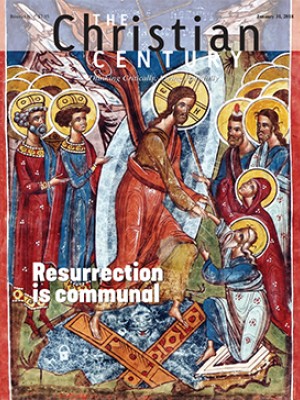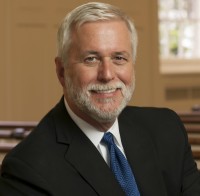When I was a young boy in Sunday school, the state of the art in media technology was the flannelgraph, a large board wrapped in flannel and perched on an easel. As our teacher, Mrs. Williams, told us a Bible story, she would place paper characters on the board when she got to their part of the drama. There were always a few palm trees and a camel or two on the board already, the background that promised another great ancient story.
The only technical problem with the flannelgraph was that the paper characters had to be pressed hard into the unfolding drama. I can still see Mrs. Williams sliding her long, boney fingers back and forth over the paper characters to get them to stay on the board. The wrinkly apostle Paul always took extra effort to smooth out. Someone once spilled Kool-Aid on him, which left him purple. Another time, Johnny Burke and I got in a fight over who would hand the apostle to Mrs. Williams, and we tore his little head off. So, in addition to being discolored, Paul was now taped together. Clearly, he had been used a lot in the biblical stories.
Read our latest issue or browse back issues.
While it may not have been her intent, Mrs. Williams was proclaiming a holy mystery to her third-graders: God is not easy on the people who are used in the biblical drama. When we look at most of the leading characters in scripture, it’s clear that by the end of their life they’re all stained and taped together. But none of them seem to have any regrets about their hard lives.
Paul was chased out of most of the towns in the Roman Empire, often with a shower of rocks behind him. And yet, when he writes his Epistle to the Philippians from prison mostly what he wants to talk about is his “surpassing joy.”
Abraham and Sarah, Jacob, Moses, David, Esther, and all of Jesus’ disciples have moments of glory. But before and after those moments, their lives are stained and torn by grief, failure, and the high cost of saying yes to their calling. Their faith is always riddled with fear, which leads them to take matters into their own hands. That always leads to more troubles. And even when they do faithfully follow their calling, conflict is always waiting around the corner. It is only God’s grace that keeps them taped together. But along the way their prayers are mostly that they will still be used in the holy drama.
These biblical characters are women and men of gravitas.
People with gravitas have weighty souls, and we’re drawn to them as we are to all things with gravitational pull. Typically they’re older, but it’s not their age as much as their maturity that we find so attractive. These people have scars, which are strangely attractive, but not open wounds. They’ve settled into themselves, and those they’re given to love, without more futile plans for re-creating what God has already called “good.” But they have a persevering thirst to find every glimpse they can get of that good.
No one is born with gravitas, and it’s not exactly a spiritual gift. It comes as a result of prayerful responses to hurts, failures, sins, and endless waiting, which are all surrendered to a relentless dream of using their fleeting years for something that makes a holy difference in the world. Others who had their same experiences became cynical or self-absorbed victims, but those with gravitas relentlessly pursued sacredness at every hard turn in life. Along the way, their weighty souls emerged as a blessing.
A search committee will never include gravitas on its wish list of attributes for a church’s next pastor. But it’s exactly what people yearn for—someone with a weighty soul who can lead them in the high drama of being a community of faith.
When parishioners pass through the dark valleys, they need their pastor to know this hard but familiar terrain. Ministers with gravitas have learned to avoid searching for answers to “Why?” questions; although the question must be asked, looking for explanations is a meandering detour. Instead, like a weathered but savvy wilderness guide, the pastor just keeps pointing to the savior who is nearer than can be seen. The poet John Keats referred to this as “negative capability,” which is the capacity “of being in uncertainties, mysteries, and doubt without any irritable reaching after fact or reason.” Anyone who walks beside people caught up in a holy drama had better be accustomed to mystery.
A faithful pastor is devoted to helping the congregation see this sacred mystery even when it’s hidden beneath the thin veneer of the ordinary. There is so much time every pastor has to spend ensuring the church’s bills are paid, the inevitable conflicts are navigated, the nursery is staffed, and the sermons are ready for the relentless return of Sundays. But the congregation’s deep desire is for someone to make holy sense of their lives through every one of these churchy routines. The ministry is a constant experience of déjà vu, as congregations keep wandering back to the same small arguments, but pastors with gravitas gave up expectations about the church a long time ago. Now, believing the holy can always break in, they have expectancy.
Most importantly, pastors with weighty souls sacrificed their dreams for the congregation in order to love it as it is. Not until the parishioners see this will they find ways of saying, “I love you too.” But when a congregation and its pastor are in love, they can do a world of good, and that gets them to the dreams of God.
A version of this article appears in the January 31 print edition under the title “A weighty soul.”






